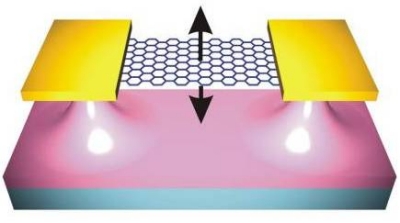May 17, 2011 — Catalan Institute of Nanotechnology Professor Adrian Bachtold and his research group created resonators from nanoscale graphene and carbon nanotubes (CNT) that exhibit nonlinear damping. This result could lead to supersensitive detectors of force or mass.
The team formed nanoscale resonators by suspending tiny graphene sheets or carbon nanotubes and clamping them at each end. These devices, similar to guitar strings, can be set to vibrate at very specific frequencies.
 |
| Figure. A depiction of the nanoscale mechanical resonators constructed with graphene and CNTs. SOURCE: Catalan Institute of Nanotechnology. |
Mechanical resonators mark time in electronic components and stabilize radio transmissions. In all mechanical resonators studied to date, from large objects several metres in size down to tiny components just a few tens of nanometers in length, damping has always been observed to occur in a highly predictable, linear manner.
Bachtold’s research demonstrates that this linear damping paradigm breaks down for resonators with critical dimensions on the atomic scale. The damping is strongly nonlinear for resonators based on nanotubes and graphene, a characteristic that facilitates amplification of signals and dramatic improvements in sensitivity.
Damping is central to the physics of nanoelectromechanical (NEMS) resonators, lying at the core of quantum and sensing experiments. Therefore many predictions that have been made for nanoscale electro-mechanical devices now need to be revisited when considering nanotube and graphene resonators. Prof. Bachtold’s group has achieved a new record in quality factor for graphene resonators and ultra-weak force sensing with a nanotube resonator, using these atomic-level devices.
Results will be published in Nature Nanotechnology (DOI 10.1038/NNANO.2011.71). To retrieve the abstract and full text, visit http://dx.doi.org/ DOI 10.1038/ NNANO.2011.71
Follow Small Times on Twitter.com by clicking www.twitter.com/smalltimes. Or join our Facebook group

